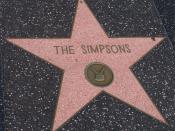Raja Halwani's essay, "Homer and Aristotle", examines Homer's character to see if he could be considered virtuous according to Aristotle's beliefs. Homer does not appear very commendable when evaluated morally, especially when the focus is on his character and not his actions. However, there are redeeming qualities about Homer, which make it impossible for the audience to really hate him. This quality enables the audience to feel for Homer, and when we are disgusted with his thoughts and decisions at times, another one of his heartwarming actions compels us to love him again. Although I agree with Halwani that Homer's love of life in the face of hardships is a very admirable trait, I disagree with some of Aristotle's criteria to be virtuous, and therefore, give Homer a lot more credit than does Halwani.
Halwani states that according to Aristotle, there are four types of character- the virtuous, the continent, the incontinent, and the vicious character.
The continent person has to resist his desires in order to do the right thing. The incontinent person gives in to his desires and fails to act properly, knowing that what he is doing is wrong. The vicious person does not have to resist his desires, and there is no weakness of will. He desires to make the morally wrong decision. The virtuous character has and practices the virtues, character traits that compel us to act in the right ways and to react in the right ways emotionally too, and has perceptive abilities regarding the situations one is faced with. The virtuous person knows that he is acting virtuously when doing the virtuous act, and does the virtuous act because he wants to do the right thing. However, I would extend this description to include those who resist temptation to do the right thing,


